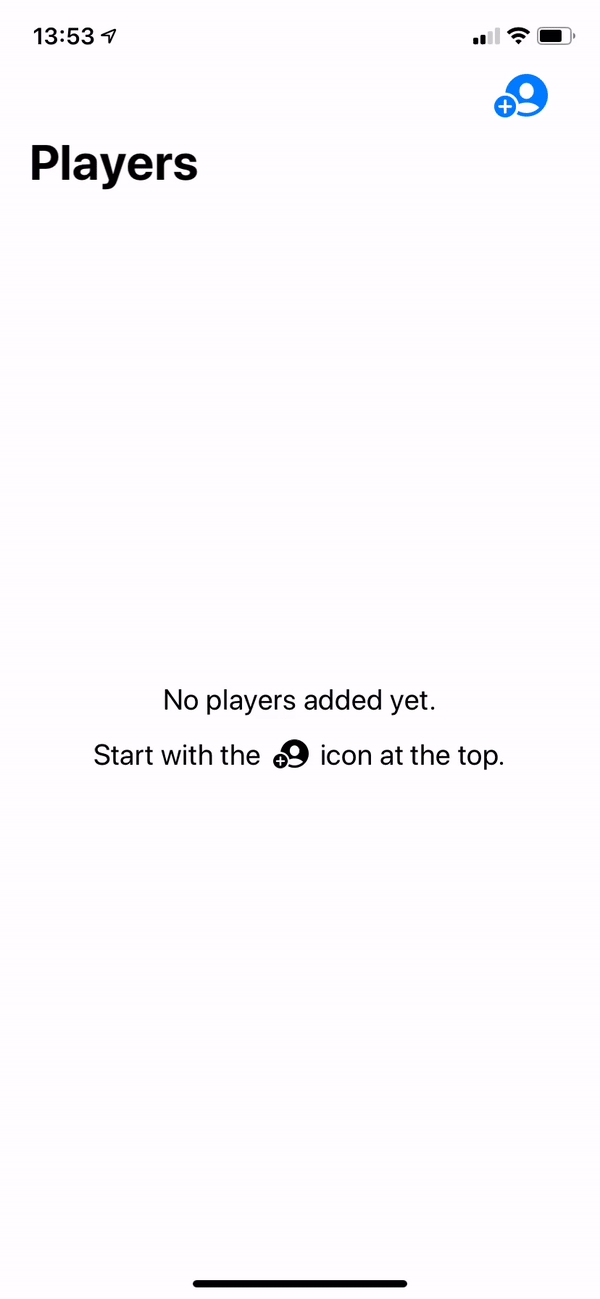Autofocus TextField programmatically in SwiftUI
I'm using a modal to add names to a list. When the modal is shown, I want to focus the TextField automatically, like this:
I've not found any suitable solutions yet.
Is there anything implemented into SwiftUI already in order to do this?
Thanks for your help.
var modal: some View {
NavigationView{
VStack{
HStack{
Spacer()
TextField("Name", text: $inputText) // autofocus this!
.textFieldStyle(DefaultTextFieldStyle())
.padding()
.font(.system(size: 25))
// something like .focus() ??
Spacer()
}
Button(action: {
if self.inputText != ""{
self.players.append(Player(name: self.inputText))
self.inputText = ""
self.isModal = false
}
}, label: {
HStack{
Text("Add \(inputText)")
Image(systemName: "plus")
}
.font(.system(size: 20))
})
.padding()
.foregroundColor(.white)
.background(Color.blue)
.cornerRadius(10)
Spacer()
}
.navigationBarTitle("New Player")
.navigationBarItems(trailing: Button(action: {self.isModal=false}, label: {Text("Cancel").font(.system(size: 20))}))
.padding()
}
}
Answer
Since Responder Chain is not presented to be consumed via SwiftUI, so we have to consume it using UIViewRepresentable. I have made a workaround that can work similarly to the way we use to do using UIKit.
struct CustomTextField: UIViewRepresentable {
class Coordinator: NSObject, UITextFieldDelegate {
@Binding var text: String
@Binding var nextResponder : Bool?
@Binding var isResponder : Bool?
init(text: Binding<String>,nextResponder : Binding<Bool?> , isResponder : Binding<Bool?>) {
_text = text
_isResponder = isResponder
_nextResponder = nextResponder
}
func textFieldDidChangeSelection(_ textField: UITextField) {
text = textField.text ?? ""
}
func textFieldDidBeginEditing(_ textField: UITextField) {
DispatchQueue.main.async {
self.isResponder = true
}
}
func textFieldDidEndEditing(_ textField: UITextField) {
DispatchQueue.main.async {
self.isResponder = false
if self.nextResponder != nil {
self.nextResponder = true
}
}
}
}
@Binding var text: String
@Binding var nextResponder : Bool?
@Binding var isResponder : Bool?
var isSecured : Bool = false
var keyboard : UIKeyboardType
func makeUIView(context: UIViewRepresentableContext<CustomTextField>) -> UITextField {
let textField = UITextField(frame: .zero)
textField.isSecureTextEntry = isSecured
textField.autocapitalizationType = .none
textField.autocorrectionType = .no
textField.keyboardType = keyboard
textField.delegate = context.coordinator
return textField
}
func makeCoordinator() -> CustomTextField.Coordinator {
return Coordinator(text: $text, nextResponder: $nextResponder, isResponder: $isResponder)
}
func updateUIView(_ uiView: UITextField, context: UIViewRepresentableContext<CustomTextField>) {
uiView.text = text
if isResponder ?? false {
uiView.becomeFirstResponder()
}
}
}
You can use this component like this...
struct ContentView : View {
@State private var usernmae = ""
@State private var password = ""
// set true , if you want to focus it initially, and set false if you want to focus it by tapping on it.
@State private var isUsernameFirstResponder : Bool? = true
@State private var isPasswordFirstResponder : Bool? = false
var body : some View {
VStack(alignment: .center) {
CustomTextField(text: $usernmae,
nextResponder: $isPasswordFirstResponder,
isResponder: $isUsernameFirstResponder,
isSecured: false,
keyboard: .default)
// assigning the next responder to nil , as this will be last textfield on the view.
CustomTextField(text: $password,
nextResponder: .constant(nil),
isResponder: $isPasswordFirstResponder,
isSecured: true,
keyboard: .default)
}
.padding(.horizontal, 50)
}
}
Here isResponder is to assigning responder to the current textfield, and nextResponder is to make the first response , as the current textfield resigns it.

